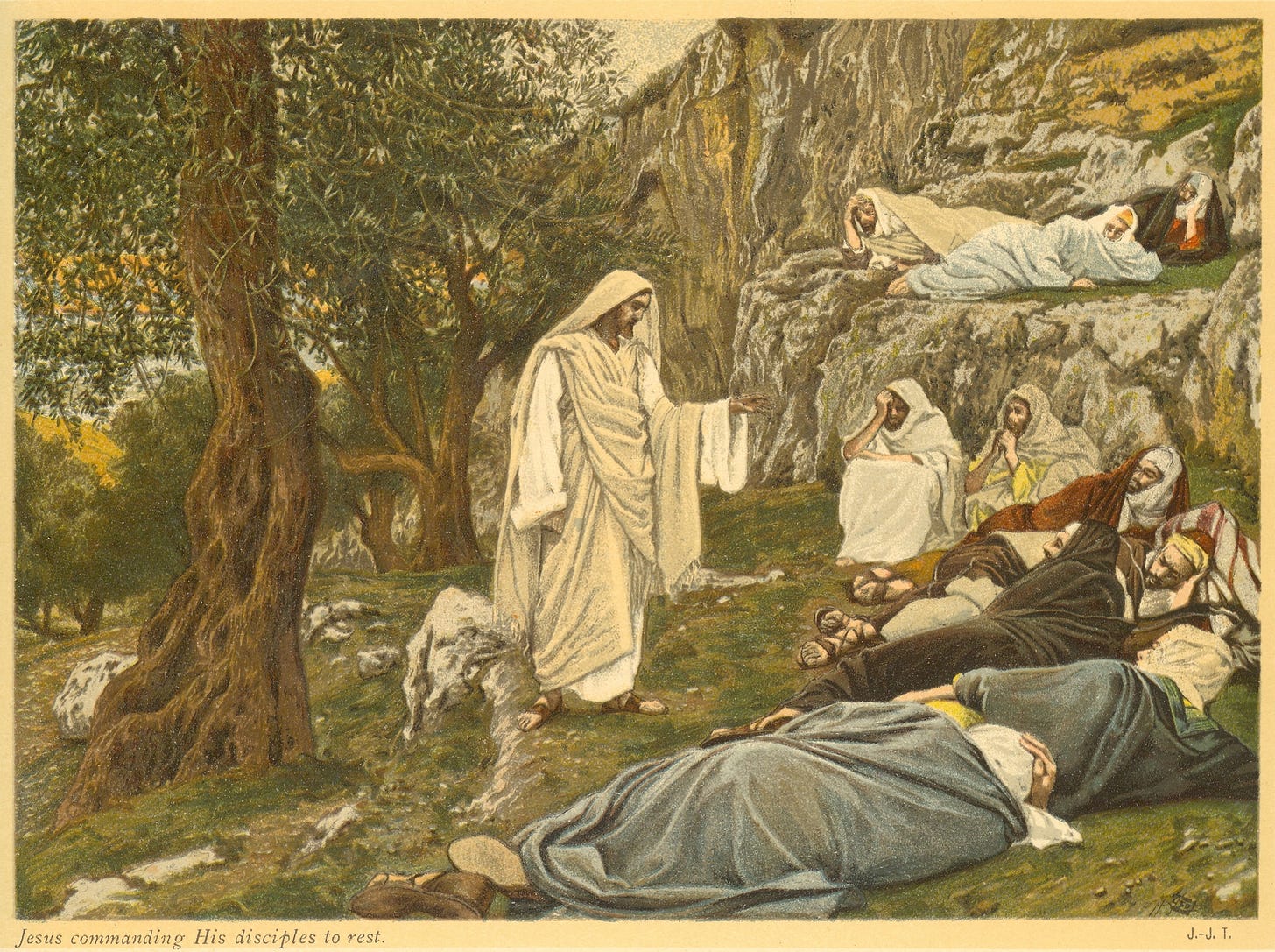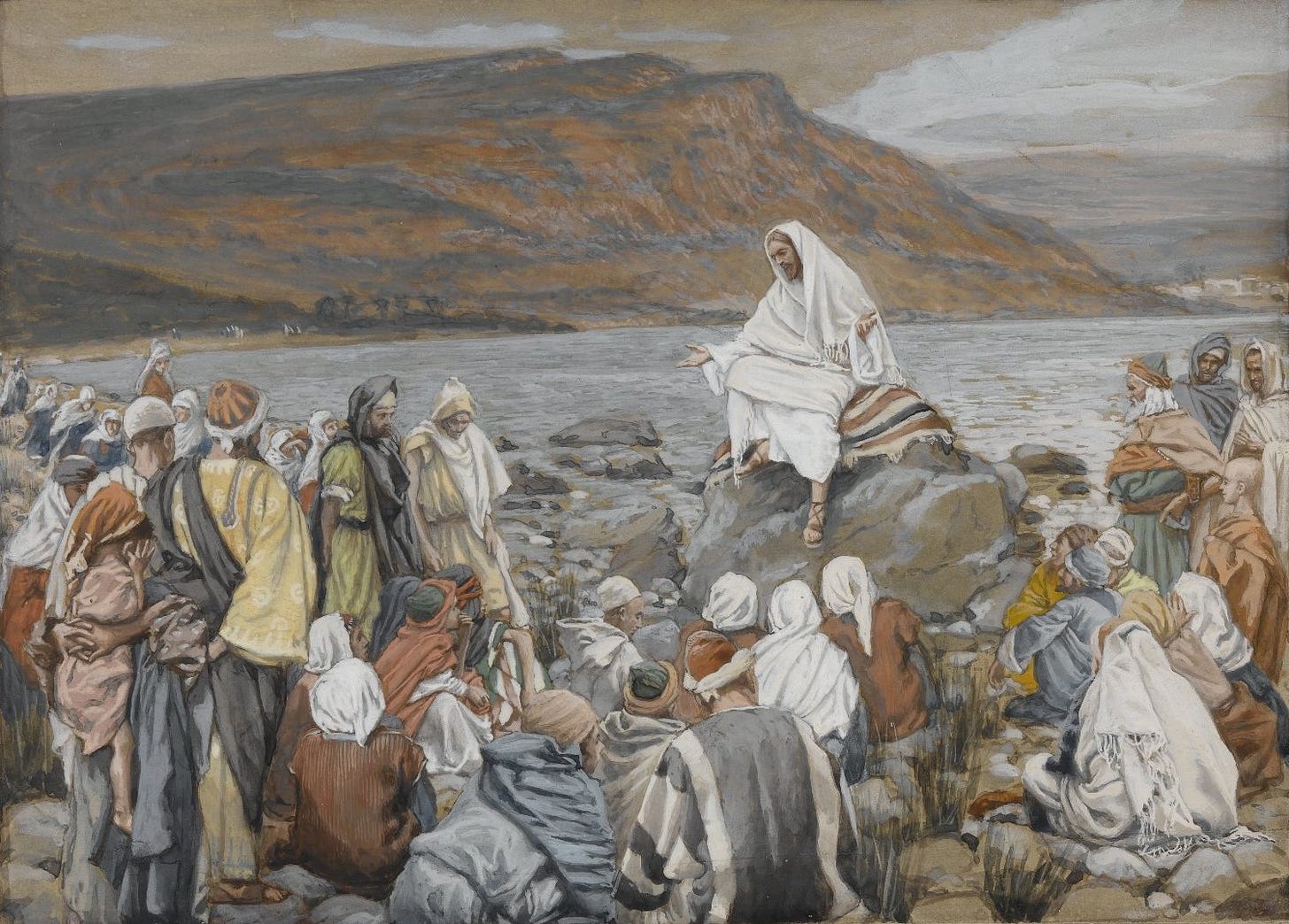Laughing with Jesus
Hearing the Humor in the Savior’s Voice
Believers in the Restoration often envision heaven as a joyful gathering full of laughter, but somehow we fail to recognize and delight in the good humor of the God who inspires this vision. We are likely to credit Joseph Smith’s personality, rather than the Spirit of God, with the comedic irreverence of his famous quip that if the Saints go to hell, they will “turn the Devils [sic] out of doors and make a heaven of it.” But the Gospels present Jesus as regularly employing a similar sort of humor, and Latter-day Saints should see this as clearly as any Christians. We should have eyes to see that the comedy in Jesus’ preaching is not a sideshow, but a central aspect of his ministry. With both wit and wisdom, he liberates his listeners from social and religious constraints and challenges them to create a new world.
The world Jesus envisions is one that offers a rich range of emotion and experience: justice and gentleness, reverence and joy, courage and peace, holiness and humor. This essay focuses on that last pairing and offers a perspective on Jesus that sees deep connections between his humor and his holiness. In this portrait, he is not just funny, but profoundly comedic in the broadest sense—clever, amusing, satirical, and ever confident in the prospect of joyful reunions and hopeful in the face of adversity.
Perhaps humor doesn’t appear on Latter-day Saint lists of Christlike virtues because of the Book of Mormon, which is mostly humorless (“chloroform in print” and all that). We might also blame the stilted, archaic prose of the King James Version, which conspires with centuries of cultural change to cloak the comedy. We have some leeway to laugh at ourselves for missing punch lines.
We miss the laughs though, even when they are at the heart of Jesus’ best-known words. For example, the Sermon on the Mount begins with the proclamation: “Blessings on the meek!” he declares, “You’re going to inherit the earth.” How would such a declaration not be laughable to subjects of the brutal Roman Empire? Are listeners supposed to imagine empires simply giving away their land to the nonviolent poor? Clearly aware of how preposterous he sounds to reasonable ears, he leans into comedic contradictions to make his points. “People don’t light a lamp and put it under a bucket.” Imagine, without laughing, lighting a lamp and immediately putting it under a bucket. “If your right eye trips you up, tear it out and throw it away.” The violence here is cartoonish. “Don’t let your left hand have any idea what your right hand is up to.” Who plays hide-and-seek with their hands?
And when issuing the sermon’s commands, Jesus paints funny pictures of ridiculous, but recognizable, human behavior. “[W]hen you give money to the poor, don’t sound a trumpet in front of you.” “When you pray, don’t pile up a jumbled heap of words! [People] reckon that the more they say, the more likely they are to be heard.” “When you fast, don’t be gloomy like the play-actors. They make their faces unrecognizable, so everyone can see they’re fasting.” These images instruct while also diminishing cultural pressure to follow along in the foolishness.
They also grab attention. Latter-day Saint writer James Goldberg captures the fun and function of humor in Jesus’ preaching in his novelistic rendition of the Gospels, The Five Books of Jesus. Here’s a taste: “When his listeners seem to be getting tired, Jesus tells funny stories: everybody laughs at the way he staggers around as if he had a giant plank sticking out of his eye while he pretends to try to pluck out a grain of sand that’s gotten in Nathanael’s.” This imaginative slapstick is not only funny, but also consistent with Jesus’ use of the surprising and the absurd in the Gospels. Surprise and absurdity are hallmarks of the rabbinic parable, his favorite comedic form, and he employs them to provoke both laughter and reflection.
In the Parable of the Lost Coin, for example, Jesus offers the comical comparison of the kingdom of God Almighty to a woman who sweeps her house to find a missing coin. As the Jewish New Testament scholar Amy-Jill Levine explains, “A king would not do this; he has staff for such annoyances. To picture the king on his hands and knees, searching for one coin or one pearl out of an entire treasury box, is to picture something foolish, something humorous. It is also to picture something potentially desirable, or challenging: a ruler who gets off his throne and down into the dirt, like the rest of us, to find what he needs.”
Jesus is up to more, though, than entertainment for the purposes of social critique. He wants his listeners to imagine and inhabit a new and often incomprehensible world, and comedy is perfectly suited to offer new eyes to envision it and a new spirit to bravely trust in its reality. His incisive, cheerful preaching doesn’t just offer new ideas. It promotes an infectious laughter that produces a felt awareness of the world’s depths and possibilities and a willingness to be joyful in the face of seemingly invincible opposition.
Jesus’ jesting is meant to conjure for his audience the possibility of a totally different world, one so improbable that the conjuring sometimes seems callous. “Blessings on you, when people slander you and persecute you, and say all kinds of wicked things about you falsely because of me! Celebrate and rejoice[!]” The audacity of this claim is so stunning that incredulous laughter may be the only reasonable response. Jesus clearly has his sights set on a kingdom unlike any human beings are familiar with, and if he is wrong about its prospects, his ministry turns dark.
We get a glimpse of such darkness as the laughter turns on him at the cross. Here’s an example from Luke: “The men who were holding Jesus began to make fun of him and knock him about. They blindfolded him. ‘Prophesy!’ they told him. ‘Who is it that’s hitting you?’” And then, like Quixote on his deathbed, Jesus seems to lose his connection to his visionary world: “My God, my God, Why did you abandon me?” Whatever laughs the New Testament offers before these wrenching death scenes, they are long forgotten by the time Jesus gives up the ghost. What did his promises mean to his followers now? The costs of his idealism are no joke.
Of course, the New Testament does not end with Jesus’ Crucifixion, and the Resurrection is crucial to its comedy. The story’s end vindicates Jesus’ robust confidence in the Age to Come and gives us room and reason to rejoice despite terrifying suffering. In the world of the New Testament, the kingdom is truly coming, as surprising and absurd as it may seem.
A kingdom that doesn’t look like a kingdom—this is Jesus’ favorite subject, or we might say, his favorite gag. And mirth is part of the point. Think of how he describes the kingdom as filled with little children, how he dubs James and John the “Sons of Thunder,” or how he dresses the Prodigal Son, foul-smelling and dirty, in his father’s best robe. Jesus’ kingdom-humor is challenging too. He issues warnings with farcical images. Camels struggle to pass through the eyes of needles, while other camels are happily gulped down by men worried about swallowing insects. And because he knows how tall an order his call can be, he gives his followers encouragement through amusing stories.
My favorite of these is the Parable of the Persistent Widow: “There was once a judge in a certain town who didn’t fear God and didn’t have any respect for people. There was a widow in that town, and she came to him and said, ‘Judge my case! Vindicate me against my enemy!’ For a long time he refused. But in the end, he said to himself, ‘It’s true that I don’t fear God and don’t have any respect for people. But because this widow is causing me a lot of trouble, I will put her case right and vindicate her, so that she doesn’t end up coming and giving me a black eye.’” If justice can be done by this bozo, Jesus implies, then think what the master of the universe can do!
The Restoration, with its sacralization of the joy of embodied sociality, should give us a feel for the holiness of this humor and the way it promotes faith in a new age of joyous, healing atonement. It should help us see how the Jesus of the Gospels looks forward to a new age of celebration—a miraculous, but also somehow mundane, feast with friends. Restoration scripture may not pack the same comedic punch the Bible does, but its unparalleled commitment to our relationships in the flesh and fearlessness in the face of our weakness point us toward the divine comedy of the gospel and Christ’s yearning for laughter and reminiscing with friends.
To our often reflexive, if also reasonable, worries about losing sight of the sacred and serious, the Jesus of the Gospels reminds us that he laughed too much for his pious critics. “When John the Baptist came,” he says, “he didn’t eat bread or drink wine, and you say, ‘He’s got a demon!’ When the son of man came, eating and drinking, you say, ‘Look! A glutton and a drunkard, a friend to tax-collectors and sinners!’” The Gospels give us ample reason to be skeptical of presentations of Jesus that are all business and no fun. From the start, he shows his abiding interest in laughter and celebration. John presents his first miracle as an offering of delicious wine for a wedding party. His good humor eternally breaks open new reservoirs of trust in a God who will conquer death and redeem worlds without end.
Obviously, we cannot ignore the solemn aspects of his life and ministry. “I have a baptism to be baptized with, and I am under huge pressure until it’s happened,” he tells his disciples. Yet we abandon the faith if we fail to recognize how, despite the pressure, Jesus presses on, motivated by a love for social, embodied, ordinary life: food and drink, wit and laughter, friends and children. Through his stories and celebrations, he invites his followers into a holy communion, which is also something like an unexpected party. So if you get an invitation to that long-awaited feast with Abraham, Isaac, and Jacob, prepare a joke or two.
James Egan works as an attorney in health care in Salt Lake City, Utah. He is the treasurer of Mormon Scholars in the Humanities, and his most recent release of piano-led pop rock is the album Invisible Light.
Art by James Tissot.








I love the way this piece opens my mind to new and refreshing characterizations of Jesus. It makes me approach the Gospels in new ways, which feels exciting and interesting!
You lifted my spirits here, James. I love the humor and satire in Jesus's teaching, and I often point it out to my kids. Now you've helped me see how to connect it to the "divine comedy" of the redemption he offers us. Happy and humorous new year to you!